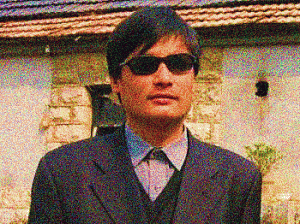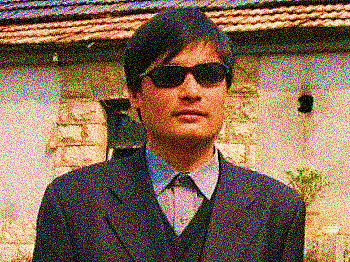
Chinese activist Chen Guangcheng
In a recent feature, the New York Post suggested that NYU was forcing Chen to leave due to pressure from the Chinese government, noting that the university plans to open a satellite campus in Shanghai this fall that is heavily subsidized by the local government. Several days later, Chen released a statement claiming that NYU had asked him to leave, and that the Chinese government had exerted “unrelenting pressure” on the university as early as last fall due to his presence there.
NYU has vehemently denied Chen’s accusations, stressing that Chen’s fellowship was always a one-year arrangement. According to its chief spokesman, John Beckman, Chen’s statement “contains a number of speculations about the role of the Chinese government in NYU’s decision-making that are both false and contradicted by the well-established facts.” Likewise, Jerome Cohen, a law professor at NYU who played a critical role in arranging Chen’s stay at the university, has affirmed NYU’s unparalleled generosity to Chen, remarking that “You shouldn’t bite the hand that feeds you.” So far, no evidence has emerged linking Chen’s departure to pressure from the Chinese government, and Chen, who is now in Taiwan for an 18-day advocacy visit, has refused to elaborate on his statement.
As if that wasn’t enough controversy, NYU recently revealed that an iPhone and iPad given to Chen soon after his arrival in America had been installed with spyware that made it possible to track his movements and online communications. (NYU technicians removed the spyware from the devices and returned them to Chen.) The devices were given to Chen by ChinaAid, a Texas-based, Christian non-profit that promotes religious freedom in China. Bob Fu, the president of ChinaAid and a longtime advocate of Chen, has denied any knowledge of the spyware.
However, Cohen, the NYU law professor, accused Chen’s supporters of giving him “a kind of Trojan horse that would have enabled them to monitor his communications secretly,” branding their actions as “perfectly consistent with their desire to manipulate and control the situation and know whatever confidential advice he is getting.” Meanwhile, Fu has alleged that NYU interfered with Chen’s access to conservative activists. It seems that none of Chen’s closest advocates can agree on what actually happened—and have therefore resorted to turning against each other.
With the lack of any tangible evidence, the intrigue surrounding Chen will probably only grow. Some have suggested that Chen’s departure is most likely unrelated to NYU’s satellite campus in Shanghai, citing Cohen’s insistence on NYU’s year-long agreement with Chen and poking holes in Chen’s suspicions about NYU’s dealings with China. In contrast, human rights advocates like Desmond Tutu have chastised NYU for potentially buckling to pressure from the Chinese government. Wild speculation abounds.
Nevertheless, Chen’s latest saga does raise important questions about the growing coziness between American universities and the Chinese government. Chen’s assertion that “academic independence and academic freedom in the United States are being greatly threatened by a totalitarian regime” is not entirely unfounded. According to the New York Times, many American universities are becoming increasingly dependent on tuition from Chinese students: nearly 200,000 of them attended American universities in 2012, a 23 percent increase from the previous year. Furthermore, a growing number of universities, including NYU and Johns Hopkins, have established, or are planning to establish, overseas branches in China.
The expansion of American universities into authoritarian countries has elicited serious concern about their ability to uphold principles like academic freedom and student expression on their satellite campuses. NYU has already been reproached for appeasing officials in Abu Dhabi, the site of another overseas branch that opened in 2010 and received lavish funding from the city-state. Similarly, Yale has faced extensive criticism for its joint venture with the National University of Singapore (Yale-NUS), which is set to open this fall in a country known for curtailing freedom of expression. Opening overseas branches, especially in authoritarian countries, is a tricky and occasionally awkward process that may compel universities to compromise their academic principles. If anything, recent developments have sparked new debate over the global expansion of universities—and opponents may have found an unlikely champion in Chen Guangcheng.
Cindy Hwang is an intern at Foreign Policy in Focus.

